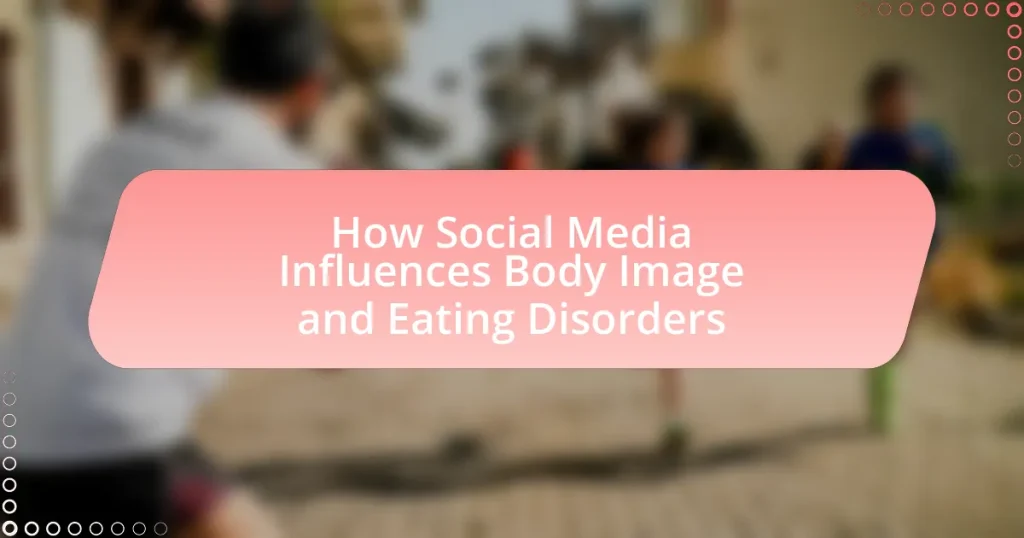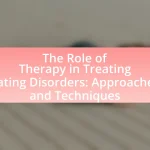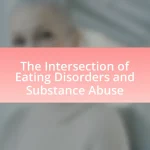Social media significantly influences body image perceptions and the prevalence of eating disorders by promoting unrealistic beauty standards and fostering a culture of comparison among users. Research indicates that exposure to idealized images on platforms like Instagram can lead to body dissatisfaction, particularly among adolescents and young adults, resulting in negative self-esteem and disordered eating behaviors. The article explores the psychological effects of social media on body image, the societal standards of beauty it perpetuates, and the connections between social media usage and eating disorders. Additionally, it discusses strategies for mitigating negative impacts, including curating social media feeds, promoting positive body image, and accessing community support and professional help.
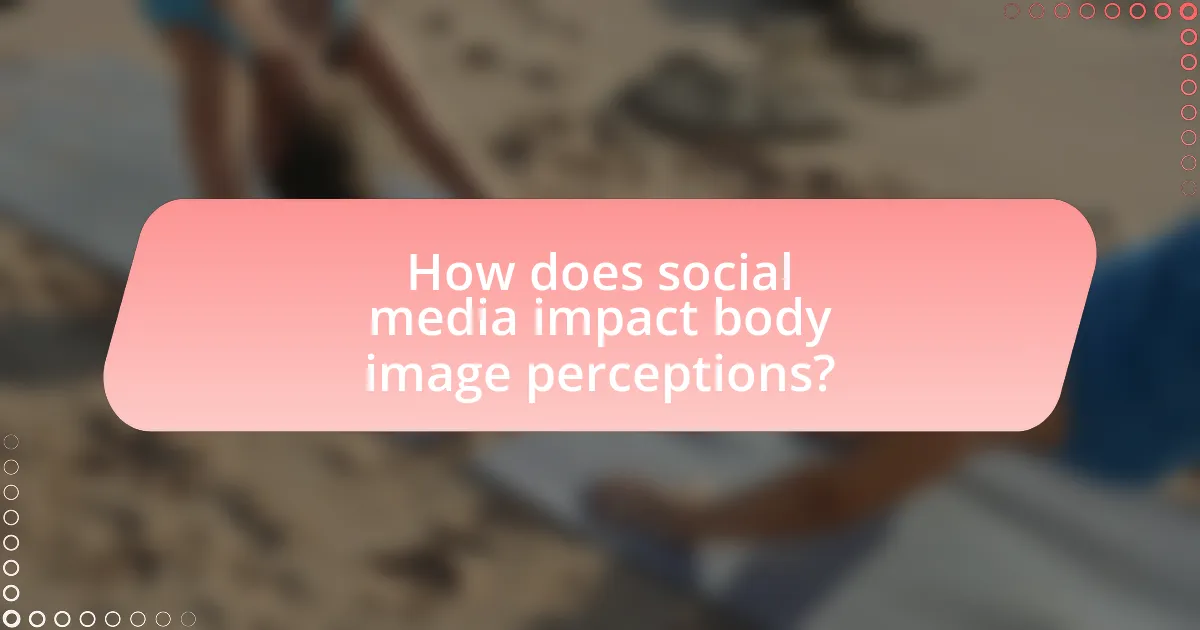
How does social media impact body image perceptions?
Social media significantly impacts body image perceptions by promoting unrealistic beauty standards and fostering comparison among users. Research indicates that exposure to idealized images on platforms like Instagram can lead to body dissatisfaction, particularly among adolescents and young adults. A study published in the journal “Body Image” found that individuals who frequently engage with appearance-focused content are more likely to experience negative body image and disordered eating behaviors. This correlation highlights the role of social media in shaping perceptions of beauty and self-worth, often leading to harmful consequences for mental health and body image.
What role do social media platforms play in shaping body image?
Social media platforms significantly influence body image by promoting idealized representations of beauty and fitness. These platforms often showcase curated images that emphasize thinness, muscularity, and specific beauty standards, leading users to compare themselves unfavorably against these ideals. Research indicates that exposure to such content can result in negative body image, increased dissatisfaction, and even contribute to the development of eating disorders. For instance, a study published in the journal “Body Image” found that individuals who frequently engage with appearance-focused social media content report higher levels of body dissatisfaction and disordered eating behaviors.
How do images and videos on social media influence self-esteem?
Images and videos on social media significantly influence self-esteem by shaping individuals’ perceptions of beauty and success. Research indicates that exposure to idealized images can lead to negative self-evaluations and body dissatisfaction, particularly among adolescents and young adults. A study published in the journal “Body Image” found that individuals who frequently engage with social media content featuring attractive models report lower self-esteem and higher levels of body dissatisfaction. This correlation is attributed to social comparison processes, where users compare themselves to the often unrealistic portrayals they see online, leading to feelings of inadequacy and diminished self-worth.
What are the psychological effects of comparing oneself to social media influencers?
Comparing oneself to social media influencers can lead to negative psychological effects, including decreased self-esteem, body dissatisfaction, and increased anxiety. Research indicates that individuals who frequently engage in social comparison with influencers often feel inadequate and develop a distorted body image, as they measure their worth against curated and often unrealistic portrayals of beauty and success. A study published in the journal “Body Image” by Tiggemann and Slater (2014) found that higher exposure to idealized images on social media correlates with greater body dissatisfaction among young women. This suggests that the psychological impact of such comparisons can contribute to the development of eating disorders and other mental health issues.
Why is body image important in the context of social media?
Body image is important in the context of social media because it significantly influences individuals’ self-esteem and mental health. Social media platforms often showcase idealized body types and lifestyles, leading to comparisons that can negatively affect users’ perceptions of their own bodies. Research indicates that exposure to such content can increase body dissatisfaction and contribute to the development of eating disorders. For instance, a study published in the journal “Body Image” found that individuals who frequently engage with appearance-focused social media content report higher levels of body dissatisfaction and disordered eating behaviors. This highlights the critical role social media plays in shaping body image perceptions and the associated risks for mental health.
How does body image relate to mental health?
Body image significantly impacts mental health, as negative perceptions of one’s body can lead to issues such as anxiety, depression, and low self-esteem. Research indicates that individuals who struggle with body image are at a higher risk for developing eating disorders, which are closely linked to mental health challenges. For instance, a study published in the journal “Body Image” found that poor body image correlates with increased levels of psychological distress, highlighting the direct relationship between how individuals perceive their bodies and their overall mental well-being.
What are the societal standards of beauty promoted on social media?
Societal standards of beauty promoted on social media emphasize thinness, flawless skin, and specific facial features, often idealized through filters and editing. Research indicates that platforms like Instagram and TikTok frequently showcase images of individuals with slim bodies, clear complexions, and symmetrical features, reinforcing a narrow definition of attractiveness. A study published in the journal “Body Image” found that exposure to idealized images on social media correlates with increased body dissatisfaction and disordered eating behaviors among users, particularly young women. This highlights the significant impact social media has on shaping perceptions of beauty and body image.
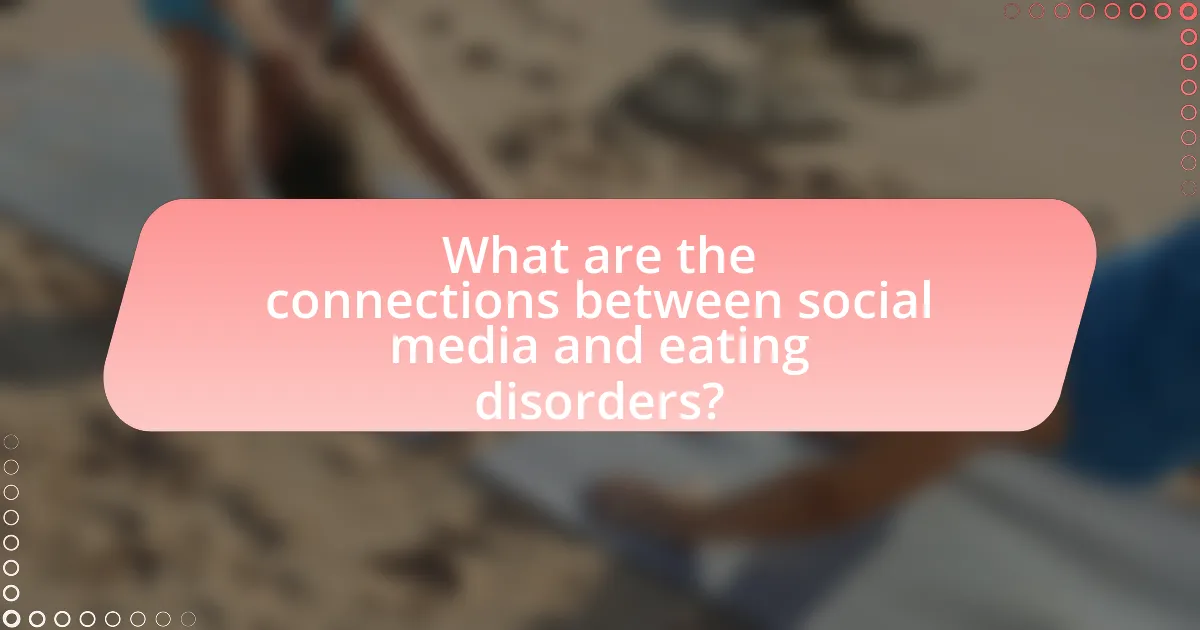
What are the connections between social media and eating disorders?
Social media significantly contributes to the development and exacerbation of eating disorders by promoting unrealistic body standards and fostering a culture of comparison. Research indicates that exposure to idealized images on platforms like Instagram and Facebook can lead to body dissatisfaction, which is a known risk factor for eating disorders. A study published in the journal “Eating Disorders” found that individuals who frequently engage with appearance-focused content are more likely to experience disordered eating behaviors. Furthermore, social media can facilitate the spread of harmful dieting trends and pro-eating disorder communities, further entrenching unhealthy behaviors.
How can social media contribute to the development of eating disorders?
Social media can contribute to the development of eating disorders by promoting unrealistic body standards and fostering a culture of comparison among users. Research indicates that exposure to idealized images on platforms like Instagram and Facebook can lead to body dissatisfaction, which is a significant risk factor for eating disorders. A study published in the journal “Body Image” found that individuals who frequently engage with appearance-focused content are more likely to develop disordered eating behaviors. Furthermore, the prevalence of pro-eating disorder communities on social media can normalize harmful behaviors and provide support for unhealthy practices, exacerbating the risk of developing eating disorders.
What types of content are most harmful in promoting eating disorders?
Content that promotes unrealistic body standards, such as images of excessively thin models or edited photos that distort physical appearance, is most harmful in promoting eating disorders. Research indicates that exposure to such content can lead to body dissatisfaction, which is a significant risk factor for developing eating disorders. A study published in the journal “Eating Disorders” found that individuals who frequently engage with idealized body images on social media are more likely to experience negative body image and disordered eating behaviors. Additionally, content that glorifies dieting, weight loss, or extreme fitness regimens can further exacerbate these issues, as it reinforces the notion that self-worth is tied to body size and shape.
How does the portrayal of dieting and fitness on social media affect eating behaviors?
The portrayal of dieting and fitness on social media significantly influences eating behaviors by promoting unrealistic body standards and encouraging restrictive eating practices. Research indicates that exposure to idealized images of fitness and dieting can lead to increased body dissatisfaction, which is linked to unhealthy eating behaviors such as binge eating or extreme dieting. A study published in the journal “Body Image” found that individuals who frequently engage with fitness-related content on platforms like Instagram are more likely to develop disordered eating patterns, as they often compare themselves to the curated lifestyles presented online. This comparison can trigger feelings of inadequacy and prompt individuals to adopt harmful dietary habits in an attempt to achieve similar results.
What are the warning signs of eating disorders influenced by social media?
Warning signs of eating disorders influenced by social media include drastic changes in eating habits, excessive focus on body image, and withdrawal from social activities. Individuals may exhibit behaviors such as extreme dieting, frequent checking of weight, or obsessive calorie counting, often driven by unrealistic body standards portrayed on social media platforms. Research indicates that exposure to idealized images can lead to body dissatisfaction, which is a significant risk factor for developing eating disorders. A study published in the journal “Eating Disorders” found that individuals who frequently engage with appearance-focused content on social media are more likely to experience negative body image and disordered eating behaviors.
How can social media usage lead to disordered eating patterns?
Social media usage can lead to disordered eating patterns by promoting unrealistic body standards and fostering comparison among users. Research indicates that exposure to idealized images on platforms like Instagram and Facebook can increase body dissatisfaction, which is a significant risk factor for developing eating disorders. A study published in the journal “Body Image” by Perloff (2014) found that individuals who frequently engage with appearance-focused content are more likely to experience negative body image and engage in unhealthy eating behaviors. This correlation highlights how social media can create an environment that normalizes disordered eating as individuals strive to meet unattainable beauty ideals.
What are the psychological triggers that social media can activate in relation to eating disorders?
Social media can activate several psychological triggers that contribute to the development and exacerbation of eating disorders, including social comparison, body dissatisfaction, and the internalization of thin ideals. Social comparison occurs when individuals evaluate their own body image against the often idealized representations of others on social media, leading to feelings of inadequacy and low self-esteem. Research indicates that exposure to images promoting thinness correlates with increased body dissatisfaction among users, particularly young women. A study published in the journal “Body Image” by Perloff (2014) found that frequent social media use is associated with a higher likelihood of engaging in unhealthy weight control behaviors. Additionally, the internalization of societal standards for beauty, often perpetuated by influencers and celebrities, can lead individuals to adopt harmful dieting practices in pursuit of these ideals.
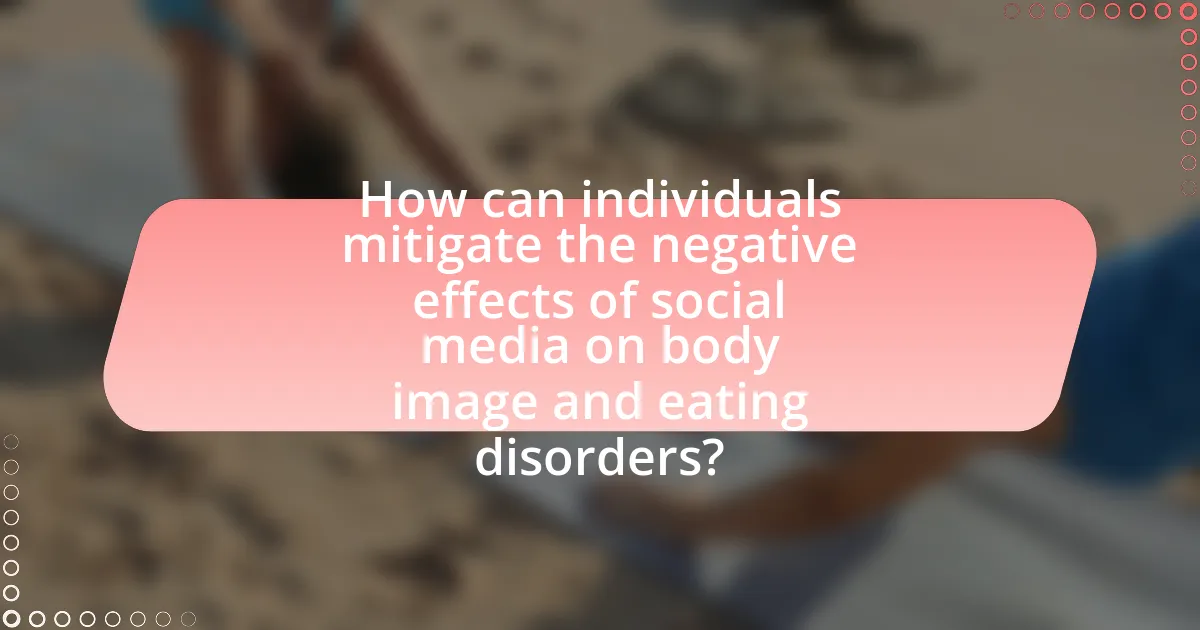
How can individuals mitigate the negative effects of social media on body image and eating disorders?
Individuals can mitigate the negative effects of social media on body image and eating disorders by curating their online environments and practicing critical media literacy. Curating involves unfollowing accounts that promote unrealistic body standards and following those that celebrate body diversity and positive self-image. Practicing critical media literacy includes analyzing the content consumed, recognizing edited images, and understanding the impact of social media on self-perception. Research indicates that individuals who engage in these practices report lower levels of body dissatisfaction and disordered eating behaviors, highlighting the effectiveness of proactive engagement with social media.
What strategies can be employed to promote a positive body image on social media?
To promote a positive body image on social media, strategies such as encouraging diverse representation, fostering supportive communities, and implementing educational campaigns can be employed. Diverse representation involves showcasing individuals of various body types, ethnicities, and abilities, which has been shown to enhance self-acceptance and reduce body dissatisfaction among viewers. Research indicates that exposure to diverse body types can lead to improved body image perceptions (Tiggemann & Slater, 2014).
Fostering supportive communities entails creating safe spaces where users can share their experiences and challenges related to body image, which can help combat feelings of isolation and promote acceptance. Studies have found that social support significantly contributes to positive body image (Tiggemann & Slater, 2014).
Implementing educational campaigns that focus on media literacy can empower users to critically evaluate the content they consume, helping them to recognize unrealistic beauty standards perpetuated by social media. This approach has been linked to increased resilience against negative body image influences (Levine & Murnen, 2009).
How can users curate their social media feeds to reduce negative influences?
Users can curate their social media feeds to reduce negative influences by actively unfollowing accounts that promote unrealistic body standards and engaging with content that fosters body positivity. Research indicates that exposure to idealized images can lead to negative body image and disordered eating behaviors, as highlighted in a study published in the journal “Body Image” by Tiggemann and Slater (2014), which found that social media use is linked to increased body dissatisfaction among young women. By selectively choosing to follow accounts that celebrate diverse body types and promote healthy lifestyles, users can create a more supportive online environment that mitigates harmful influences.
What role does media literacy play in combating harmful body image messages?
Media literacy plays a crucial role in combating harmful body image messages by equipping individuals with the skills to critically analyze and evaluate media content. This critical analysis enables people to recognize unrealistic beauty standards and the manipulation of images, which are prevalent in social media and advertising. Research indicates that individuals with higher media literacy are less likely to internalize negative body image messages and more likely to challenge harmful portrayals of beauty. For instance, a study published in the journal “Body Image” found that media literacy interventions significantly reduced body dissatisfaction among adolescents, highlighting the effectiveness of education in fostering resilience against harmful media influences.
What resources are available for those struggling with body image and eating disorders?
Resources available for those struggling with body image and eating disorders include professional therapy, support groups, hotlines, and educational materials. Professional therapy, such as cognitive-behavioral therapy (CBT), has been shown to be effective in treating eating disorders, with studies indicating that CBT can lead to significant improvements in symptoms. Support groups, like those offered by the National Eating Disorders Association (NEDA), provide community and shared experiences, which can be crucial for recovery. Hotlines, such as the National Eating Disorders Association Helpline, offer immediate support and guidance. Additionally, educational materials from reputable organizations help individuals understand body image issues and eating disorders, promoting awareness and recovery strategies.
How can professional help be accessed through social media platforms?
Professional help can be accessed through social media platforms by utilizing features such as direct messaging, live chats, and dedicated support groups. Many mental health professionals and organizations maintain active social media profiles where they offer advice, share resources, and provide contact information for further assistance. For instance, platforms like Instagram and Facebook host numerous pages and groups focused on body image and eating disorders, allowing individuals to connect with professionals who specialize in these areas. Research indicates that 70% of mental health professionals use social media to engage with clients, highlighting its effectiveness as a tool for accessing support and information.
What community support options exist for individuals affected by these issues?
Community support options for individuals affected by body image issues and eating disorders include support groups, counseling services, and online forums. Support groups, such as those offered by organizations like the National Eating Disorders Association, provide a safe space for individuals to share experiences and receive encouragement. Counseling services, including therapy from licensed professionals specializing in eating disorders, offer personalized strategies for coping and recovery. Online forums, such as those found on platforms like Reddit or specialized websites, allow individuals to connect with others facing similar challenges, fostering a sense of community and shared understanding. These options are vital as they provide emotional support, resources, and a platform for discussion, which are essential for recovery and well-being.
What practical tips can help maintain a healthy relationship with social media?
To maintain a healthy relationship with social media, individuals should set specific time limits for usage. Research indicates that excessive social media use can lead to negative body image and increased risk of eating disorders, as highlighted in a study published in the journal “Body Image” by Tiggemann and Slater (2014), which found that higher social media engagement correlates with body dissatisfaction. Additionally, curating feeds to include positive and diverse representations of body types can foster a more supportive online environment. Engaging in regular digital detoxes, where individuals take breaks from social media, has also been shown to improve mental well-being and reduce anxiety related to social comparisons.
